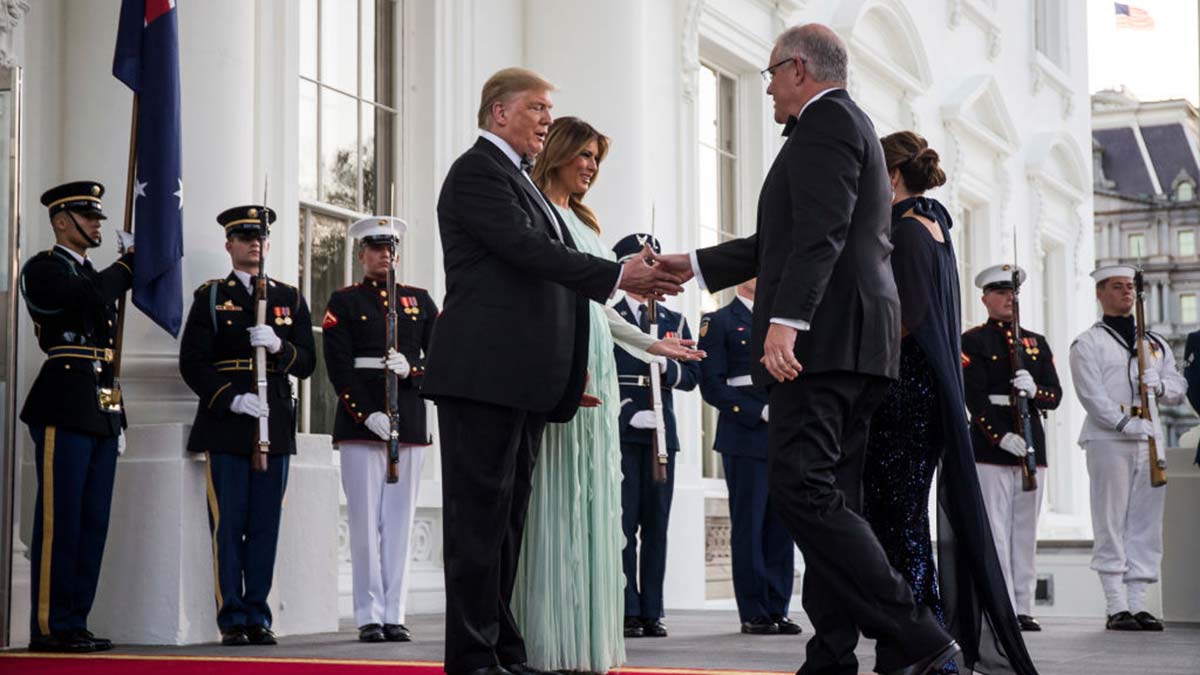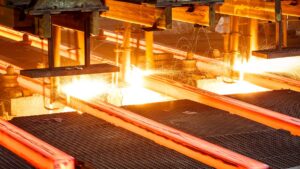Supporting growth of ‘strategic metal’ supply chains in the US gains fresh momentum

US President Donald Trump and First Lady Melania Trump greet Australian Prime Minister Scott Morrison and Australian First Lady Jennifer Morrison (Photo by Zach Gibson/Getty Images)
Special Report: The US Government should be doing even more to incentivise the domestic production of ‘critical minerals’ like lithium, a bipartisan group of US senators announced this week.
The US is capable of being a leader in the development of the minerals needed for clean energy technologies, but is currently losing the race to China, said Senator Lisa Murkowski, who chairs the US Senate’s Energy and Natural Resources Committee.
And Australia is now also desperately trying to broaden its partnership with the US in a bid to ensure it too doesn’t fall short of the much-needed critical minerals.
Prime Minister Scott Morrison is in Washington DC this week to meet with US President Donald Trump to discuss US-Australia co-operation on critical minerals.
Rare earths are an essential material in electric vehicles, particularly permanent magnets.
The US’ intense focus on its domestic battery supply chain has already led to early positives for junior players like emerging lithium-boron producer ioneer (ASX:INR).
ioneer is rapidly advancing its low-cost Rhyolite Ridge Project in Nevada which will produce 20,000 tonnes of lithium carbonate at full capacity.
The company’s goal is to become the first major lithium mine in the US to supply a domestic lithium-ion battery supply chain.
Last Thursday, Amazon announced it would purchase 100,000 electric delivery vans from Rivian Automotive between 2021 and 2024.
“This designation of critical minerals that President Trump introduced a while back started the ball rolling in terms of streamlining permit process times and requirements, and our project has certainly been a beneficiary of that,” Managing Director Bernard Rowe told Stockhead previously.
Don’t forget about the boron
What distinguishes Rhyolite Ridge from other lithium projects is the boron co-product.
It’s shaping up as a key mineral in many products whose demand is rapidly increasing due to urbanisation in Asia, and ensuring farms get the best out of their crops.
It’s estimated that just two producers control 80 per cent of the refined boron market, which has helped prices remain stable.
For now anyway, because Turkey supplies 50 per cent of the world’s boron and has the majority of the world’s boron reserves.
Any inflammation of the political situation in the Middle East would pose an issue for borate end-users reliant on Turkish supply, particularly in European markets.
A heightened desire to secure non-Turkish supply should help ioneer in its boron offtake partnering process.
In the US, for example, a company called Corning supplies Apple with precision glass for its iPhones, iPads, and watches.
Boron is a key component of that glass.
This could make Apple and Corning potential US partners for ioneer, as both rely on lithium and boron in their products.
Also just last week, Apple said it would award Corning $250 million from a $5 billion fund dedicated to advanced manufacturing in the US, which builds on the $200 million that Corning received in 2017.
“Glass for every generation of iPhone, including iPhone 11 and iPhone 11 Pro which will be available later this week, has been made at Corning’s Harrodsburg, Kentucky plant,” Apple says.
“Apple’s Advanced Manufacturing Fund was designed to foster and support the innovative production and high-skill jobs that will help fuel a new era of technology-driven manufacturing in the US.”
And minerals are the fundamental building blocks for any modern technology, Senator Lisa Murkowski says.
“In the energy world, batteries don’t work without lithium, without graphite, cobalt, and nickel. And we all know these minerals don’t just appear out of thin air.”
Right now, the United States is falling further behind in the global race to control supply chains for new technologies, she says.
“Allowing that to happen is a massive strategic mistake.”
>> Now listen: The Explorers Podcast with Barry FitzGerald: ioneer
This story was developed in collaboration with ioneer, a Stockhead advertiser at the time of publishing.
This story does not constitute financial product advice. You should consider obtaining independent advice before making any financial decisions.
UNLOCK INSIGHTS
Discover the untold stories of emerging ASX stocks.
Daily news and expert analysis, it's free to subscribe.
By proceeding, you confirm you understand that we handle personal information in accordance with our Privacy Policy.








